西方文化介绍introduction of western culture lesson7 - Start of the Modern Era现代时期
- 格式:ppt
- 大小:13.48 MB
- 文档页数:36
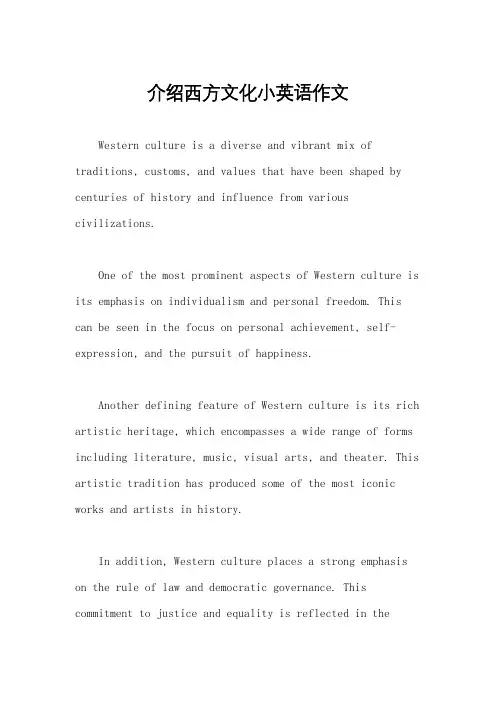
介绍西方文化小英语作文Western culture is a diverse and vibrant mix of traditions, customs, and values that have been shaped by centuries of history and influence from various civilizations.One of the most prominent aspects of Western culture is its emphasis on individualism and personal freedom. This can be seen in the focus on personal achievement, self-expression, and the pursuit of happiness.Another defining feature of Western culture is its rich artistic heritage, which encompasses a wide range of forms including literature, music, visual arts, and theater. This artistic tradition has produced some of the most iconic works and artists in history.In addition, Western culture places a strong emphasis on the rule of law and democratic governance. This commitment to justice and equality is reflected in thelegal systems and political institutions of Western societies.Furthermore, Western culture has a strong tradition of scientific inquiry and technological innovation. This hasled to major advancements in fields such as medicine, engineering, and information technology.Moreover, Western culture has a rich culinary tradition that varies widely from region to region. From Italianpasta to French pastries to American barbecue, the cuisineof the West is as diverse as its people.Finally, Western culture has a strong tradition ofsports and leisure activities, with a wide range of popular pastimes including football, basketball, skiing, and hiking.In conclusion, Western culture is a complex and multifaceted phenomenon that encompasses a wide range of traditions, values, and practices. Its rich history and diverse influences have shaped it into a dynamic and influential force in the world today.。
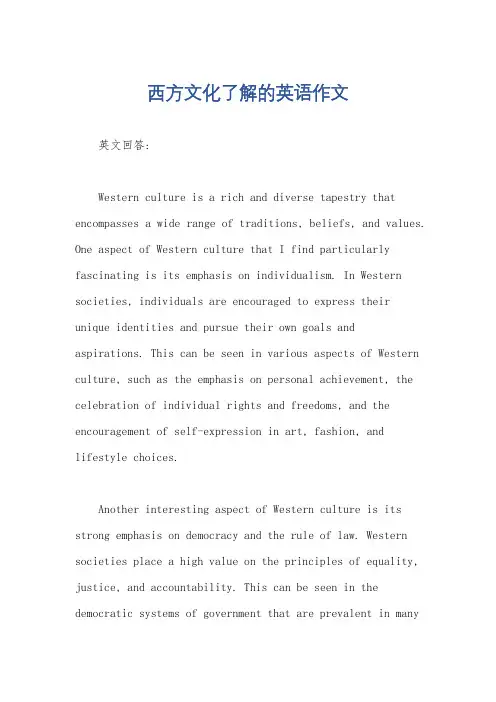
西方文化了解的英语作文英文回答:Western culture is a rich and diverse tapestry that encompasses a wide range of traditions, beliefs, and values. One aspect of Western culture that I find particularly fascinating is its emphasis on individualism. In Western societies, individuals are encouraged to express their unique identities and pursue their own goals and aspirations. This can be seen in various aspects of Western culture, such as the emphasis on personal achievement, the celebration of individual rights and freedoms, and the encouragement of self-expression in art, fashion, and lifestyle choices.Another interesting aspect of Western culture is its strong emphasis on democracy and the rule of law. Western societies place a high value on the principles of equality, justice, and accountability. This can be seen in the democratic systems of government that are prevalent in manyWestern countries, where citizens have the right to vote and participate in decision-making processes. The rule of law ensures that everyone is subject to the same set of laws and regulations, regardless of their social status or position of power.Furthermore, Western culture is known for itsscientific and technological advancements. Western societies have made significant contributions to fields such as medicine, engineering, and information technology. This emphasis on innovation and progress has led to numerous breakthroughs and advancements that have greatly improved the quality of life for people around the world. For example, Western countries have pioneered the development of vaccines, medical treatments, and communication technologies that have revolutionized healthcare and connectivity.In addition, Western culture places a strong emphasis on education and intellectual pursuits. Western societies value knowledge, critical thinking, and intellectual curiosity. This can be seen in the emphasis on formaleducation, the availability of libraries and educational resources, and the promotion of lifelong learning. Western countries have renowned universities and researchinstitutions that attract students and scholars from all over the world, fostering a vibrant intellectual community.中文回答:西方文化是一个丰富多样的织锦,包含了各种传统、信仰和价值观。

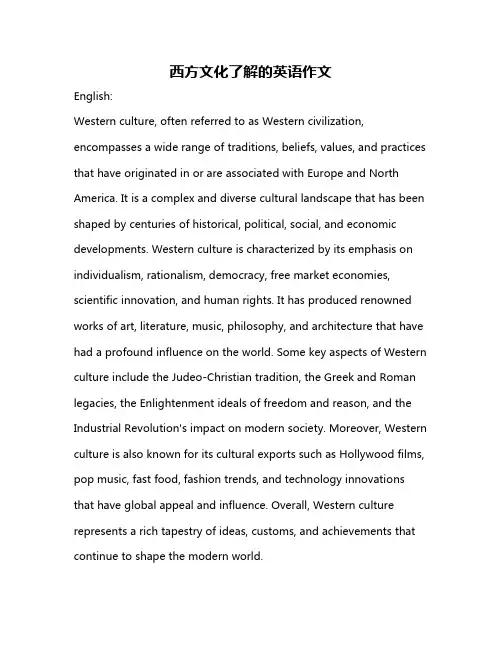
西方文化了解的英语作文English:Western culture, often referred to as Western civilization, encompasses a wide range of traditions, beliefs, values, and practices that have originated in or are associated with Europe and North America. It is a complex and diverse cultural landscape that has been shaped by centuries of historical, political, social, and economic developments. Western culture is characterized by its emphasis on individualism, rationalism, democracy, free market economies, scientific innovation, and human rights. It has produced renowned works of art, literature, music, philosophy, and architecture that have had a profound influence on the world. Some key aspects of Western culture include the Judeo-Christian tradition, the Greek and Roman legacies, the Enlightenment ideals of freedom and reason, and the Industrial Revolution's impact on modern society. Moreover, Western culture is also known for its cultural exports such as Hollywood films, pop music, fast food, fashion trends, and technology innovations that have global appeal and influence. Overall, Western culture represents a rich tapestry of ideas, customs, and achievements that continue to shape the modern world.中文翻译:西方文化,通常被称为西方文明,涵盖了起源于欧洲和北美洲或与之相关的广泛传统、信仰、价值观和实践。
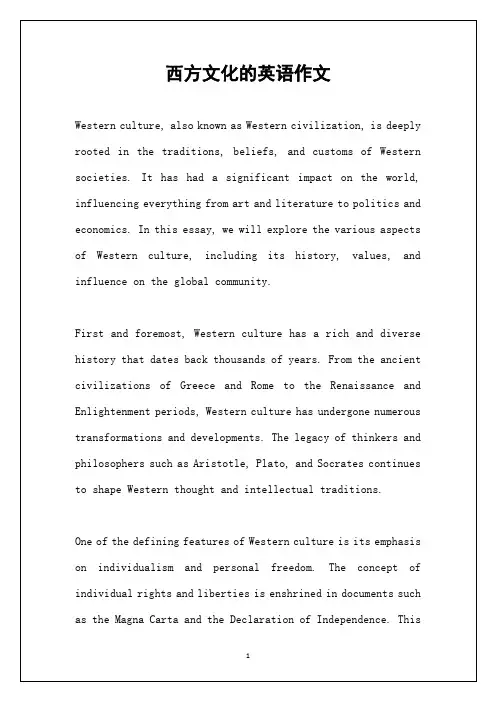
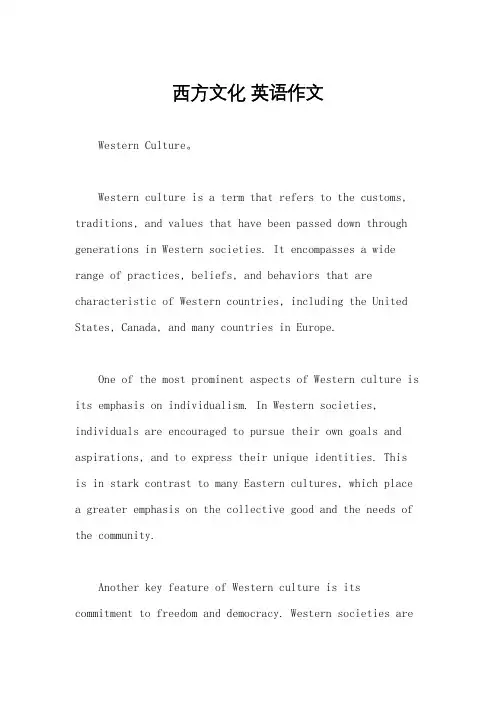
西方文化英语作文Western Culture。
Western culture is a term that refers to the customs, traditions, and values that have been passed down through generations in Western societies. It encompasses a wide range of practices, beliefs, and behaviors that are characteristic of Western countries, including the United States, Canada, and many countries in Europe.One of the most prominent aspects of Western culture is its emphasis on individualism. In Western societies, individuals are encouraged to pursue their own goals and aspirations, and to express their unique identities. This is in stark contrast to many Eastern cultures, which place a greater emphasis on the collective good and the needs of the community.Another key feature of Western culture is its commitment to freedom and democracy. Western societies arefounded on the principles of liberty, equality, and justice, and are dedicated to protecting the rights of their citizens. This commitment is reflected in the political systems of Western countries, which are often characterized by free and fair elections, independent judiciaries, and a strong emphasis on human rights.In addition to these values, Western culture is also known for its rich artistic and intellectual heritage. Western societies have produced some of the world's most influential and enduring works of art, literature, music, and philosophy. From the paintings of Leonardo da Vinci to the plays of William Shakespeare, Western culture has madea profound impact on the world of art and ideas.Of course, Western culture is not without its flaws. Critics argue that Western societies can be overly materialistic, individualistic, and consumerist, and that they have often failed to live up to their professed ideals of freedom and equality. Moreover, some argue that Western culture has been responsible for the spread of harmful practices, such as imperialism, colonialism, andenvironmental degradation.Despite these criticisms, Western culture continues to exert a powerful influence on the world stage. Its values and ideas have spread across the globe, shaping the way people think, behave, and interact with one another. Whether it is through the spread of democracy, the popularity of Western fashion and entertainment, or the global reach of Western corporations, Western culture continues to leave its mark on the world.In conclusion, Western culture is a complex and multifaceted phenomenon that encompasses a wide range of values, beliefs, and practices. While it is not without its flaws, Western culture has made a profound impact on the world, shaping the way people think, behave, and interact with one another. Whether it is through its commitment to individualism, its dedication to freedom and democracy, or its rich artistic and intellectual heritage, Westernculture continues to play a significant role in shaping the global community.。
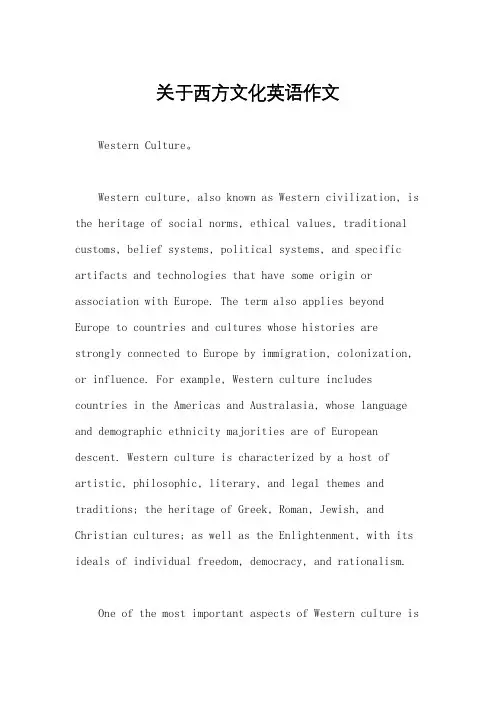
关于西方文化英语作文Western Culture。
Western culture, also known as Western civilization, is the heritage of social norms, ethical values, traditional customs, belief systems, political systems, and specific artifacts and technologies that have some origin or association with Europe. The term also applies beyond Europe to countries and cultures whose histories are strongly connected to Europe by immigration, colonization, or influence. For example, Western culture includes countries in the Americas and Australasia, whose language and demographic ethnicity majorities are of European descent. Western culture is characterized by a host of artistic, philosophic, literary, and legal themes and traditions; the heritage of Greek, Roman, Jewish, and Christian cultures; as well as the Enlightenment, with its ideals of individual freedom, democracy, and rationalism.One of the most important aspects of Western culture isits emphasis on individualism. Western societies tend to place a high value on individual rights, freedoms, and achievements. This can be seen in the emphasis on personal success and self-expression in Western art, literature, and popular culture. In Western countries, individuals are encouraged to pursue their own goals and dreams, and to express themselves in unique and creative ways.Another key aspect of Western culture is its commitment to democracy and the rule of law. Western societies have developed systems of government that are based on the principles of individual rights, equality before the law, and the consent of the governed. This has led to the establishment of democratic institutions and the rule of law in many Western countries, which are designed toprotect the rights and freedoms of individuals and to ensure that power is exercised responsibly and accountably.Western culture also places a high value on education and the pursuit of knowledge. This can be seen in the emphasis on scientific inquiry, critical thinking, and intellectual curiosity in Western academic institutions.Western societies have a long tradition of supporting and promoting education, and many of the world's leading universities and research institutions are located in Western countries.In addition, Western culture has had a significant impact on the development of global capitalism and consumerism. Western countries have been at the forefront of the development and spread of capitalist economic systems, which emphasize free markets, private property, and individual entrepreneurship. This has led to the creation of a global economy that is driven by consumer demand and the pursuit of profit, and has had far-reaching effects on the cultures and economies of countries around the world.However, it is important to recognize that Western culture is not monolithic, and that it encompasses a wide range of diverse traditions, beliefs, and practices. Western societies are home to a rich tapestry of cultural, ethnic, and religious diversity, and there is no single "Western culture" that can be easily defined orcharacterized. It is important to approach the study of Western culture with an open mind and a willingness to engage with its complexities and contradictions.In conclusion, Western culture is a complex and multifaceted phenomenon that has had a profound impact on the world. Its emphasis on individualism, democracy, education, and capitalism has shaped the values and institutions of many societies, and its influence can be seen in the arts, literature, and popular culture of countries around the globe. However, it is important to approach the study of Western culture with a critical and open-minded perspective, and to recognize the diversity and complexity of its traditions and practices.。
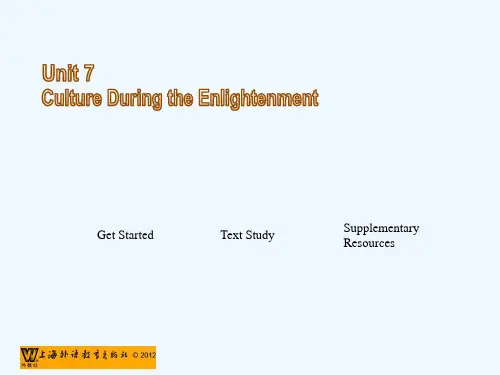
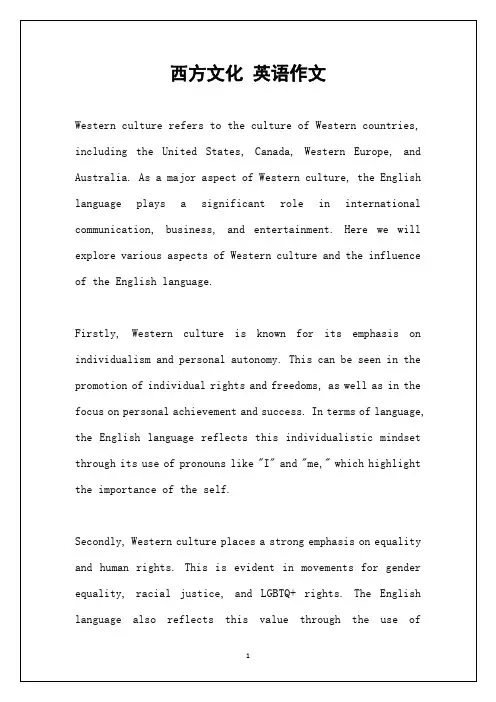
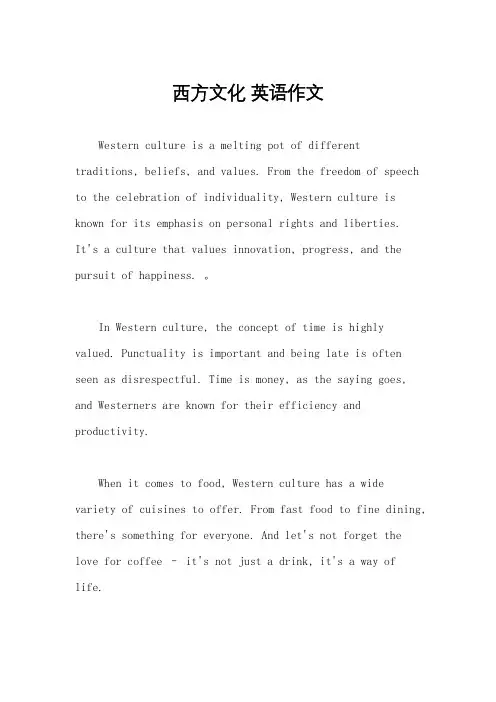
西方文化英语作文Western culture is a melting pot of differenttraditions, beliefs, and values. From the freedom of speech to the celebration of individuality, Western culture is known for its emphasis on personal rights and liberties.It's a culture that values innovation, progress, and the pursuit of happiness. 。
In Western culture, the concept of time is highly valued. Punctuality is important and being late is often seen as disrespectful. Time is money, as the saying goes, and Westerners are known for their efficiency and productivity.When it comes to food, Western culture has a widevariety of cuisines to offer. From fast food to fine dining, there's something for everyone. And let's not forget the love for coffee – it's not just a drink, it's a way oflife.In terms of fashion, Western culture is diverse andever-changing. From haute couture to street style, there's no shortage of trends to follow. Individuality is celebrated, and self-expression through clothing is a common sight.Music is another integral part of Western culture. From rock and roll to hip-hop, the Western world has produced some of the most iconic musicians and bands. Musicfestivals and concerts are a big part of the cultural scene, and people from all walks of life come together to enjoythe universal language of music.The concept of freedom is deeply ingrained in Western culture. Freedom of speech, freedom of religion, and freedom of choice are all highly valued. It's a culturethat encourages people to speak their minds and stand upfor what they believe in.Overall, Western culture is a rich tapestry of traditions, values, and beliefs that continue to evolve andshape the world we live in. It's a culture that celebrates diversity, individuality, and the pursuit of happiness.。
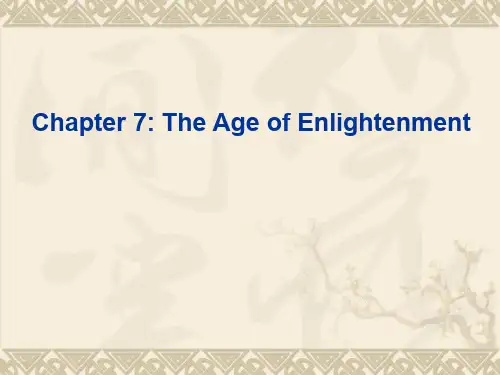
西方文化课程英语作文范文Western culture, with its diverse and rich history, has significantly influenced the world in various ways. From the ancient Roman and Greek civilizations to the modern technological advancements, the West has always been at the forefront of shaping human thought, art, and society. This essay aims to delve into the various aspects of Western culture, including its historical roots, contributions to art and literature, and the impact on global society.Historical RootsThe foundations of Western culture can be traced back to the classical civilizations of ancient Greece and Rome. These societies laid the groundwork for many of the principles that would later define Western thought, such as democracy, philosophy, and the rule of law. The Renaissance, a period of renewed interest in the arts and sciences, further propelled Western culture into a new era of intellectual and artistic achievement.Contributions to Art and LiteratureWestern culture has produced some of the most renownedartists and writers in history. From the works of William Shakespeare and Leonardo da Vinci to the modern contributions of authors like Ernest Hemingway and painters such as Pablo Picasso, the West has been a crucible for creative expression.The development of various art movements, such as Romanticism, Impressionism, and Cubism, has not only shaped the Western artistic landscape but also influenced global artistic trends.Impact on Global SocietyThe influence of Western culture extends beyond its borders, impacting global society in profound ways. The Age of Exploration, driven by European powers, led to the discoveryof new lands and the exchange of ideas, goods, and cultureson a global scale. The Industrial Revolution, originating in the West, transformed the world economy and the way peoplelive and work. Today, Western values such as human rights, individualism, and the importance of education areincreasingly embraced worldwide.Challenges and CritiquesDespite its many contributions, Western culture also faces challenges and critiques. Issues such as cultural imperialism, where Western values are imposed on other societies, have led to calls for a more inclusive and diverse global dialogue. Additionally, the rapid pace of change brought about by Western innovations has sometimes resulted in a loss of traditional practices and values.ConclusionIn conclusion, Western culture is a complex and multifaceted entity that has played a pivotal role in shaping the world as we know it. Its historical roots, artistic and literarycontributions, and global impact are undeniable. As we continue to navigate an increasingly interconnected world, it is essential to appreciate and understand the richness of Western culture while also recognizing the importance of cultural diversity and exchange.。
西方文化英语作文介绍模板英文回答:Western Culture。
Western culture encompasses the cultural, social, and political values of the Western world, which has its roots in ancient Greece and Rome. It has been shaped byinfluential historical events, such as the Renaissance, the Enlightenment, and the Industrial Revolution, and has spread globally through colonization and trade.Key Characteristics of Western Culture:Individualism: Western culture values individual rights, freedom, and self-expression.Rationalism: It emphasizes reason, logic, andscientific inquiry.Secularism: Western culture generally separatesreligion from the state and promotes tolerance of different beliefs.Democracy: It values representative government, civil liberties, and human rights.Materialism: Western culture places importance on economic growth, technological advancement, and consumerism.Influence of Western Culture:Western culture has had a profound impact on global affairs. It has:Shaped political systems and economic models worldwide.Influenced art, music, literature, and cinema.Spread scientific and technological advancements.Promoted human rights and civil liberties.Challenges to Western Culture:In recent decades, Western culture has faced challenges, including:Globalization and multiculturalism.The rise of fundamentalism and authoritarianism.Economic inequality and environmental degradation.中文回答:西方文化。
1.The World of Western Culture2.Western world’s culture during The second half of the twentieth century was marked by Diversity. Although many trends represented A continuation of prewar modern development, new directions have led some observers to speak of A “postmodern”cultural world.3. Trends in art and literatureThe United States dominated the art world after World War II. Vibrantly colored and filled with activity, reflected the energy and exuberance of postwar America.New York City became the artistic center of the Western world.The Guggenheim Museum, Whitney Museum. Promoted modern art and helped determine artistic tastes throughout much of the world.4. Abstractionism, especially Abstract Expressionism, took over the artistic mainstream,Jackson Pollock, his swirling forms and seemingly chaotic patterns broke all conventions of form and structure. His drip paintings were influential (influence) with other artists.Lavender Mist, assault the viewer with emotion and movement.5. The early 1960s saw the emergence of Pop Art, which took images of popular culture and transformed them into works of fine art. Andy Warhol6. In the 1980s, styles emerged that have been referred to as postmodern. Postmodernism tends to move away from the futurism or “cutting edge” qualities of modernism. It favors tradition, that elevating traditional craftsmanship to the level of fine art. They gained respect as artists.7.Postmodernism was also evident in literature. One center of postmodernism was in central and eastern Europe. Kundera , who blended fantasy with realism, using fantasy to examine moral issues while remaining optimistic about the human condition. His first novel,The Unbearable Lightness of Being. The human spirit can be diminished but not destroyed.8. In postwar literature, the most significant new trend was called the “Theater of the Absurd”. Samuel Beckett, the most famous proponent.Unlike traditionaltheater, suspense is maintained not by having the audience wonder “What is going to happen next?” but simply “What is happening now”.9. The sense of meaninglessness also underscored the philosophy of existentialism. Albert Camus and Jean Paul Sartre. The starting point of the existentialism of Sartre and Camus was the absence of God in the universe. It meant that humans had no preordained destiny and were utterly alone in the universe, with no future and no hope. Reduced to despair and depression, humans have but one ground of hope----themselves.10.The Revival of ReligionA number of religious thinkers and leaders attempted to bring new life to Christianity in the twentieth century.Karl Barth infuses traditional Christian teachings with new life. To Barth, the sinful and hence imperfect nature of human beings meant that humans could know religious truth not through reason but only through the grace of God.11. In the Catholic church,attempts at religious renewal came from two charismatic popes---- John XXIII and John Paul II.John XXIII sparked a dramatic revival of Catholicism when he summoned the twenty-first ecumenical council of the Catholic church. The Mass was celebrated in the vernacular languages rather than Latin.John Paul II . Although he alienated a number of people by reasserting traditional Catholic teaching on such issues as birth control, women in the priesthood, and clerical celibacy, John Paul’s numerous travels around the world helped strengthen the Catholic church throughout the non-western world.12. The New World of Science and TechnologyMany of the scientific and technological achievements since World War II have revolutionized people’s lives.During the war, university scientists were recruited to work for their governments and develop new weapons and practical instruments of war.British physicists played an important role in an improved radar system that helped defeat the German air force in the Battle of Britain.German scientists created self-propelled rockets as well as jet airplanes to keep Hitler’s hopes alive for a miraculous turnaround in the war.13.The most famous product of wartime scientific research was the atomic bomb, created by a team of American and European scientists under the guidance of the physicist J. Robert Oppenheimer. The computer may yet prove to be the most revolutionary of all the technological inventions of the twentieth century. The British mathematician Alan Turing designed a primitive computer to assist British intelligence in breaking the secret codes of German ciphering machines. Early computers required thousands of vacuum tubes to function, large and took up considerable space. The development of the transistor and the silicon chip.In 1971, the microprocessor, combines the equivalent of transistors on a single, tiny silicon chip, opened the road for the development of the personal computer.14. By 2000, the personal computer had become a regular fixture in businesses, schools, and homes. The Internet----the world’s largest computer network----provides millions of people around the world with quick access to immense quantities of information. The computer make a whole host of tasks much easier, but it has also become an important tool in modern life.In the 1960s and 1970s some people believed that some technological advances had far-reaching side effects damaging to the environment. The threat of global warming and dwindling of forests and lakes made environmentalism one of the important issues of the early twenty-first century.15. The Explosion of Popular CultureSince World War II, popular culture has played an increasingly important role in helping Western people define themselves.The history of popular culture is also the history of the economic system thatsupports it.16. Popular culture and the Americanization of the worldThe United States has been the most influential force in shaping popular culture in the West. Through movies, music, advertising, and television, the United States has spread its particular form of consumerism and the American dream to millions around the world. In movies, televisions, and music, the impact of American popular culture on the Western world is pervasive. “T he film is to America what the flag was once to Britain.”17. Motion pictures were the primary vehicle for the diffusion of American popular culture. Dominate both European and American markets. In the 1960s, as television spread around the world, American networks sold their products in Europe and the Third World at extraordinarily low prices. The United States has also dominated popular music since the end of World War II. All of them originated in the United States, and all are rooted in African American musical innovations. These forms later spread to the rest of the world, inspiring local artists who then transformed the music in their own way. The establishment of the video music channel MTV in the early 1980s changed the music scene by making image as important as sound to the selling of records.18. In the postwar years, sports have become a major product of both popular culture and the leisure industry. The development of satellite television and various electronic breakthroughs helped make sports a global phenomenon.19. Toward a Global Civilization?Increasingly, people are becoming aware of the political and economic interdependence of the world’s nations and the global nature of our contemporary problems. At the beginning of the twenty-first century, human beings are coming to understand that destructive forces unleashed in any part of the world. Nuclear proliferation means radioactive fallout for the planet.20. Smokestack pollution can produce acid rain. Oil spills and dumping of wastes. The consumption of drugs affects the stability of both wealthy and less developed nations. In reflection on the terrorist crisis, “how fragile are our frontiers inthe fact of the world’s new challenges.”Terrorism is an important example as international terrorist groups seek to wreak havoc around the world.21. One approach has been to develop grassroots social movements, including those devoted to the environment, women’s and men’s liberation, human potential, appropriate technologies, and nonviolence. “Think globally, act locally” is one slogan these groups use. The growth of non-governmental organizations (NGOs), NGOs are an important instrument in the cultivation of global perspectives. Include professional, business, and cooperative organizations; foundations; religious, peace, and disarmament groups; youth and women’s organizations; environmental and human rights groups; and research institutes.22. Yet hopes for global approaches to global problems have also been hindered by political, ethnic, and religious disputes. Pollution of the Rhine River by factories along its banks provokes angry disputes among European nations. The Unite States and Canada have argued about the effects of acid rain on Canadian forests. The collapse of the Soviet Union and its satellite system between 1989 and 1991 seemed to provide an enormous boots to the potential for international cooperation on global issues; Led to the emergence of squabbling new nations and an atmosphere of conflict and tension throughout much of Eastern Europe. The bloody conflict in the former Yugoslavia clearly indicates the dangers in the rise of nationalist sentiment among various ethnic and religious groups in Eastern Europe. Even as the world becomes more global in culture and interdependent in its mutual relations, centrifugal forces are still at work attempting to redefine the political, cultural, and ethnic ways in which the world is divided.Many lessons can be learned from the history of Western civilization, an understanding of our Western heritage and its lessons can be instrumental in helping us create new models for the future. For we are all creators of history, and the future of Western and indeed world civilization depends on us.ResumeName: Dong YiAddress:Bldg.No.15, Rm.209, China University of Geosciences, XueYuan Road, HaiDian District, Beijing, 100083Date of Birth: December 15, 1991Sex: FemaleMarital status: SingleHealth: ExcellentEducation:2007-2010 Petroleum Middle School, Beijing2010-2014 China University of Geosciences, BeijingMajor: EnglishReceived B.A. in English, July 2014Work experience:2008 V olunteer for cleanerOlympic Park Environmental ProtectionAwards and Scholarships:2009-2010 “Excellent Student”, Petroleum Middle School2010 “Bridge Design Award”, Petroleum Middle SchoolInterests: Travel, dancing, swimmingReferences: Available upon request。
关于西方文化的英语作文Western culture, also known as Western civilization, is a term used to describe the cultural and social norms, beliefs, and traditions that have developed in Western countries, including those in Europe and North America. It is a diverse and complex culture that has been shaped by a variety of influences, including ancient Greek and Roman civilizations, Christianity, the Renaissance, and the Enlightenment.One of the defining features of Western culture is its emphasis on individualism and personal freedom. In Western societies, individuals are encouraged to pursue their own goals and ambitions, and to express themselves freely. This has led to the development of a wide range of artistic and intellectual movements, from the Renaissance to Romanticism to modernism, that have had a profound impact on the world.Another important aspect of Western culture is its commitment to democracy and the rule of law. Westerncountries have a long tradition of democratic governance, and have developed legal systems that protect the rights of individuals and ensure that power is held accountable. This commitment to democracy and the rule of law has been a driving force behind many of the social and political changes that have occurred in Western countries over the centuries.Western culture is also known for its scientific and technological achievements. The Western world has been at the forefront of many major scientific and technological advancements, from the development of the printing press and the steam engine to the invention of the internet and the smartphone. These innovations have had a profound impact on the way we live and work, and have helped to shape the modern world.At the same time, Western culture has also been criticized for its materialism and consumerism. In many Western countries, there is a strong emphasis on acquiring wealth and possessions, and this has led to concerns about the impact of consumerism on the environment and on thewell-being of individuals.Overall, Western culture is a complex and multifaceted phenomenon that has had a profound impact on the world. Its emphasis on individualism and personal freedom, its commitment to democracy and the rule of law, and its scientific and technological achievements have helped to shape the modern world in many ways. However, it is also important to recognize the challenges and criticisms that Western culture faces, and to work towards creating a more just and sustainable society for all.。
西方文化了解的英语作文English Answer:Western culture is a diverse and complex tapestry of traditions, beliefs, and values that have been shaped over centuries by a multitude of factors. It encompasses the entirety of human civilization that has developed in Europe since the fall of the Western Roman Empire, as well as the cultural traditions of European descent that have developed in the Americas, Australasia, and other regions of the world.One of the defining characteristics of Western culture is its emphasis on individualism. This is reflected in the emphasis on personal freedom, self-reliance, and thepursuit of individual goals. Western culture also places a high value on rational thought and scientific inquiry, which has led to significant advancements in science, technology, and medicine.Another important aspect of Western culture is its Christian heritage. Christianity has played a major role in shaping Western values and institutions, and its influence can be seen in everything from art and architecture to law and politics. However, in recent centuries, Western culture has become increasingly secularized, and the influence of Christianity has declined somewhat.Western culture is also known for its artistic achievements. The Renaissance period in Europe saw a flourishing of painting, sculpture, and architecture, and Western artists have continued to produce groundbreaking work in the centuries since. Western literature is also highly regarded, and works by authors such as Shakespeare, Dickens, and Hemingway are read and studied all over the world.Of course, Western culture is not without its flaws. Some critics argue that its emphasis on individualism has led to a culture of selfishness and greed. Others point to the history of colonialism and imperialism as evidence of Western culture's darker side. However, there is no doubtthat Western culture has made a significant contribution to human civilization, and it continues to exert a powerful influence on the world today.中文回答:西方文化是一个传统、信仰和价值观的多样复杂集合体,几个世纪以来,其塑造受到多种因素的影响。